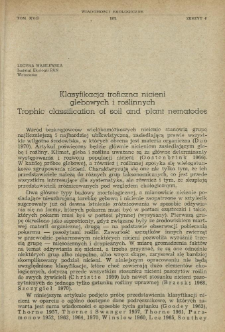
Object
Title: Klasyfikacja troficzna nicieni glebowych i roślinnych
Subtitle:
Trophic classification of soil and plant nematodes
Contributor:
Polska Akademia Nauk. Komitet Ekologiczny
Publisher:
Place of publishing:
Description:
Pages 379-388 ; 24 cm ; Bibliographical references (pages 386-388) ; Abstract in English
Type of object:
Abstract:
The article deals with the ecological classification of nematodes living in soil and in plants. A review is given of ecological classification based on the views of diffferent authors.The authors aim was to base classification of soil and plant nematodes primarily on trophic relations and to treat all other characters of the group distingushed, even those of an ecological nature, as of secondary importance from this aspect. If therefore the kind of food consumed is to be accepted as a criterion for classification then the following trophic groups can be distinguished: I - microbivorous, II - fungivorous, III - parasites of higher plants, IV -omnivorous and V - predators.The author considers this division as the most suitable for studies aimed at ascertaining the connections between the trophic levels of dififerent ecosystems, and consequently also for studies on the flow of energy through the ecosystem. It must, however, be remembered that this division involves a considerable degree of simplification. The systematic appurtenance of each of the trophic groups is given, indicating difficulties in classifying of the systematic units. The phenomenon of mycophagism connected with the facultative way of life of some Tylenchida, is dealt with in slightly greater detail. Omnivorous nematodes, obtaining their food from different trophic levels. also present a difficult problem in ecological classification. When our knowledge of the different species of this group is extended and the natural situation determining the kind of food they consume known, the matter will become far more simple, and this will permit of far more exact differentiation of his group from the trophic aspect. Mention is also made of the act that the role of nematodes as consumers has an additional aspect, namely the pathogenic activity of pathogenes and the indirect influence of many species of nematodes (from different trophic groups) on occurence of plant diseases.
Relation:
Volume:
Issue:
Start page:
End page:
Detailed Resource Type:
Resource Identifier:
oai:rcin.org.pl:144348 ; ISSN 0013-2969
Source:
MiIZ PAN, call no. P.3259 ; click here to follow the link
Language:
Language of abstract:
Rights:
Creative Commons Attribution BY 3.0 PL license
Terms of use:
Copyright-protected material. [CC BY 3.0 PL] May be used within the scope specified in Creative Commons Attribution BY 3.0 PL license, full text available at: ; -
Digitizing institution:
Museum and Institute of Zoology of the Polish Academy of Sciences
Original in:
Library of the Museum and Institute of Zoology of the Polish Academy of Sciences
Projects co-financed by:
Access:
Object collections:
- Digital Repository of Scientific Institutes > Partners' collections > Museum and Institute of Zoology PAS > Scientific Journals
- Digital Repository of Scientific Institutes > Literature > Journals/Articles
Last modified:
Feb 4, 2022
In our library since:
Oct 26, 2020
Number of object content downloads / hits:
118
All available object's versions:
https://rcin.org.pl/publication/104328
Show description in RDF format:
Show description in RDFa format:
Show description in OAI-PMH format:
| Edition name | Date |
|---|---|
| Z. 4. Klasyfikacja troficzna nicieni glebowych i roślinnych / Wasilewska L. | Feb 4, 2022 |
Objects Similar
Roguska-Wasilewska, Lucyna
Dmowska, Ewa
Brzeski, Michał Wacław (1937–1999) Państwowe Wydawnictwo Naukowe (1951–1992) Polska Akademia Nauk. Instytut Zoologii
Clark, W. C
Wasilewska, Lucyna
Brzeski, Michał Wacław (1937–1999) Winiszewska-Ślipińska, Grażyna Polska Akademia Nauk. Muzeum i Instytut Zoologii

 INSTYTUT ARCHEOLOGII I ETNOLOGII POLSKIEJ AKADEMII NAUK
INSTYTUT ARCHEOLOGII I ETNOLOGII POLSKIEJ AKADEMII NAUK
 INSTYTUT BADAŃ LITERACKICH POLSKIEJ AKADEMII NAUK
INSTYTUT BADAŃ LITERACKICH POLSKIEJ AKADEMII NAUK
 INSTYTUT BADAWCZY LEŚNICTWA
INSTYTUT BADAWCZY LEŚNICTWA
 INSTYTUT BIOLOGII DOŚWIADCZALNEJ IM. MARCELEGO NENCKIEGO POLSKIEJ AKADEMII NAUK
INSTYTUT BIOLOGII DOŚWIADCZALNEJ IM. MARCELEGO NENCKIEGO POLSKIEJ AKADEMII NAUK
 INSTYTUT BIOLOGII SSAKÓW POLSKIEJ AKADEMII NAUK
INSTYTUT BIOLOGII SSAKÓW POLSKIEJ AKADEMII NAUK
 INSTYTUT CHEMII FIZYCZNEJ PAN
INSTYTUT CHEMII FIZYCZNEJ PAN
 INSTYTUT CHEMII ORGANICZNEJ PAN
INSTYTUT CHEMII ORGANICZNEJ PAN
 INSTYTUT FILOZOFII I SOCJOLOGII PAN
INSTYTUT FILOZOFII I SOCJOLOGII PAN
 INSTYTUT GEOGRAFII I PRZESTRZENNEGO ZAGOSPODAROWANIA PAN
INSTYTUT GEOGRAFII I PRZESTRZENNEGO ZAGOSPODAROWANIA PAN
 INSTYTUT HISTORII im. TADEUSZA MANTEUFFLA POLSKIEJ AKADEMII NAUK
INSTYTUT HISTORII im. TADEUSZA MANTEUFFLA POLSKIEJ AKADEMII NAUK
 INSTYTUT JĘZYKA POLSKIEGO POLSKIEJ AKADEMII NAUK
INSTYTUT JĘZYKA POLSKIEGO POLSKIEJ AKADEMII NAUK
 INSTYTUT MATEMATYCZNY PAN
INSTYTUT MATEMATYCZNY PAN
 INSTYTUT MEDYCYNY DOŚWIADCZALNEJ I KLINICZNEJ IM.MIROSŁAWA MOSSAKOWSKIEGO POLSKIEJ AKADEMII NAUK
INSTYTUT MEDYCYNY DOŚWIADCZALNEJ I KLINICZNEJ IM.MIROSŁAWA MOSSAKOWSKIEGO POLSKIEJ AKADEMII NAUK
 INSTYTUT PODSTAWOWYCH PROBLEMÓW TECHNIKI PAN
INSTYTUT PODSTAWOWYCH PROBLEMÓW TECHNIKI PAN
 INSTYTUT SLAWISTYKI PAN
INSTYTUT SLAWISTYKI PAN
 SIEĆ BADAWCZA ŁUKASIEWICZ - INSTYTUT TECHNOLOGII MATERIAŁÓW ELEKTRONICZNYCH
SIEĆ BADAWCZA ŁUKASIEWICZ - INSTYTUT TECHNOLOGII MATERIAŁÓW ELEKTRONICZNYCH
 MUZEUM I INSTYTUT ZOOLOGII POLSKIEJ AKADEMII NAUK
MUZEUM I INSTYTUT ZOOLOGII POLSKIEJ AKADEMII NAUK
 INSTYTUT BADAŃ SYSTEMOWYCH PAN
INSTYTUT BADAŃ SYSTEMOWYCH PAN
 INSTYTUT BOTANIKI IM. WŁADYSŁAWA SZAFERA POLSKIEJ AKADEMII NAUK
INSTYTUT BOTANIKI IM. WŁADYSŁAWA SZAFERA POLSKIEJ AKADEMII NAUK


































